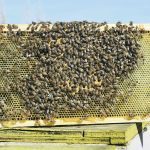
Wheat exports survive China pull-back
China significantly reduced its imports from all exporters this year, but Canadian sales to other customers remain strong

Former Agriculture Minister Charlie Mayer dead at 89
Mayer fought for Canadian wheat nationally and internationally

China announces retaliatory tariffs on Canadian canola oil, peas and pork

Researchers scramble to understand verticillium in Canada
Disease is a relative newcomer to Canada and has been the subject of little research globally

Crop Production Show 2025: How do fertilizer reductions impact the oat industry?
Considerations for industry competitiveness should be top of mind, says researcher at Crop Week 2025

Tariff uncertainty builds as inauguration nears
Market researcher told Crop Production Show 2025 attendees agriculture will be affected differently

Find your agriculture news during the mail strike

Trump victory puts spotlight on trade

Study finds alkaline soil promotes soil fungus
Alberta researchers determine that verticillium stripe is more severe in canola growing regions where pH is 7.4 to 8.6
WINNIPEG — Verticillium stripe is a more common and troublesome disease for canola growers on the eastern half of the Prairies, particularly in Manitoba. Meanwhile, verticillium isn’t a huge issue in Alberta. There may be a simple reason for this geographic variation — soil pH. Researchers at the University of Alberta have learned that Verticillium […] Read more
Researchers study how to breed queen bees in Canada
A $4.5 million project will explore how queens and nucleus colonies can be over-wintered to avoid importing them
WINNIPEG — Every spring, Canadian beekeepers deal with the same unpleasant problem. A percentage of their hives fail to survive the winter — possibly 20 to 40 per cent — so they import queen bees and small nucleus colonies from New Zealand, Australia or Hawaii to replace them. Bee experts from British Columbia, Alberta and […] Read more


